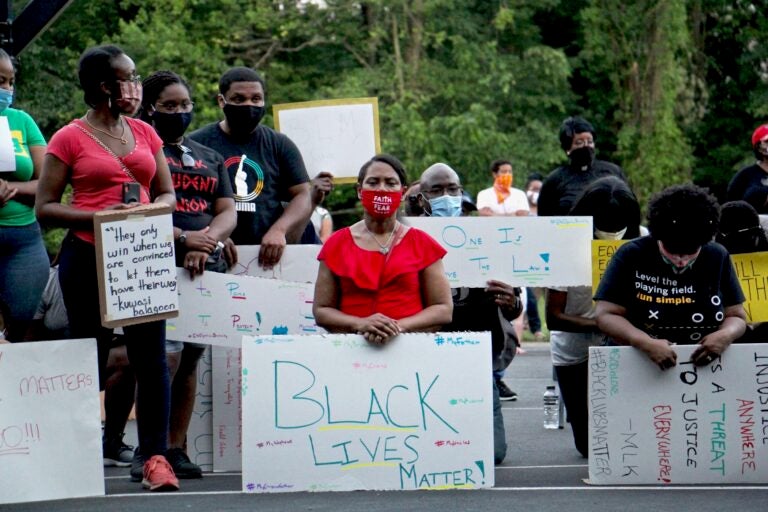AP changes writing style to capitalize ‘b’ in Black
It conveys "an essential and shared sense of history, identity and community among people who identify as Black, including those in the African diaspora and within Africa."

Protesters kneel for 8 minutes and 46 seconds in remembrance of George Floyd during a Black Lives Matter rally at Linconia Park in Bensalem, Pa. Floyd was killed in Minneapolis police custody by an officer who kneeled on his neck, sparking protests in cities and towns across the country. (Emma Lee/WHYY)
The Associated Press changed its writing style guide Friday to capitalize the “b” in the term Black when referring to people in a racial, ethnic or cultural context, weighing in on a hotly debated issue.
The change conveys “an essential and shared sense of history, identity and community among people who identify as Black, including those in the African diaspora and within Africa,” John Daniszewski, AP’s vice president of standards, said in a blog post Friday. “The lowercase black is a color, not a person.”
The news organization will also now capitalize Indigenous in reference to original inhabitants of a place.
Daniszewski said the revisions aligned with long-standing identifiers such as Latino, Asian American and Native American. He said the decision followed more than two years of research and debate among AP journalists and outside groups and thinkers.
“Our discussions on style and language consider many points, including the need to be inclusive and respectful in our storytelling and the evolution of language,” he wrote. “We believe this change serves those ends.”
The AP said it expects to make a decision within a month on whether to capitalize the term white. Among the considerations are what that change might mean outside the United States.
An ongoing debate over capitalization of Black accelerated in many U.S. newsrooms in recent weeks as journalists grappled with massive protests and sweeping changes in the aftermath of George Floyd’s death at the hands of police.
The Los Angeles Times, USA Today and NBC News last week embraced capitalization, and the National Association of Black Journalists urged other news organizations to follow.
The AP Stylebook of usage policies is highly influential in the industry, with many news organizations, government and public relations agencies using it as a guide.
The death of Floyd, a Black man who died after a white Minneapolis police officer pressed a knee to his neck, sparked nationwide protests and lent momentum to a variety of social changes, from police reform and the public removal of Confederate statues and flags to the capitalization of Black.
“It’s certainly long overdue,” said Doris Truong, director of training and diversity at the Poynter Institute, a journalism think tank. “It’s something that people who are Black have been calling for for a long time.”
It’s also a relatively simple step for news organizations dealing anew with many complex issues, such as whether their journalists can be opinionated on social media or march in Black Lives Matter demonstrations.
Nearly a century ago, sociologist W.E.B. DuBois waged a letter-writing campaign to get newspapers to capitalize Negro, saying a lowercase “n” was a sign of disrespect and racism. The New York Times took his advice in 1930, calling it an act of recognition and respect for those who’d spent generations in “the lower case.”
Negro fell out of fashion with the Black Power movement of the 1960s, coming to symbolize subservience. African American was often used, but is not always accurate — some Black people don’t trace their lineage to Africa.
One Black scholar who published an open letter to the AP earlier this week calling for the capitalization said Friday he was pleased that the change happened on Juneteenth, which commemorates when the last enslaved African Americans learned they were free 155 years ago.
“Not having a capital letter has felt disrespectful,” said David Lanham, director of communications for the Brooking Institution’s Metropolitan Policy Program. “There is a shared cultural identity with Black Americans and that goes through our shared experiences. That also goes to the lack of geographic history as a result of slavery.”
The Seattle Times and Boston Globe both changed their practices to capitalize Black late last year. The Globe explained that the word has evolved from a description of a person’s skin color to signify a race and culture, and deserves the uppercase treatment much the way other ethnic terms do.
Lanham, who spearheaded an internal process to capitalize Black at Brookings last year, said he expects AP’s shift will lead many other news organizations and other groups to make a similar change.
“Knowing how closely their Stylebook is viewed as the Bible for journalism, this is now the big domino to fall,” he said.
WHYY is your source for fact-based, in-depth journalism and information. As a nonprofit organization, we rely on financial support from readers like you. Please give today.




